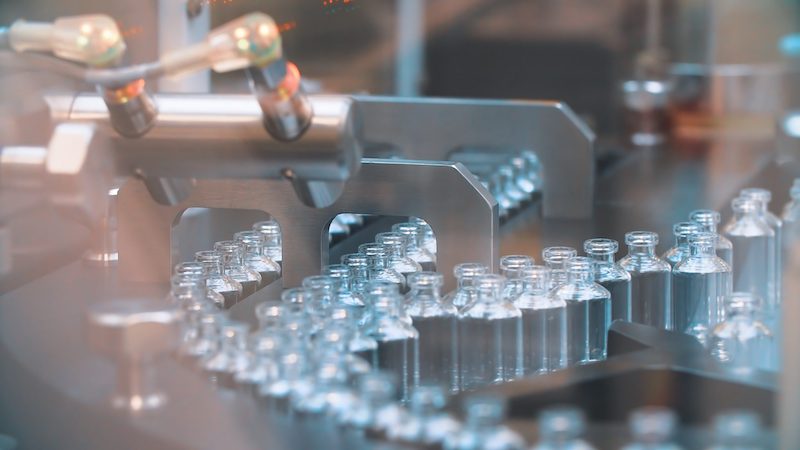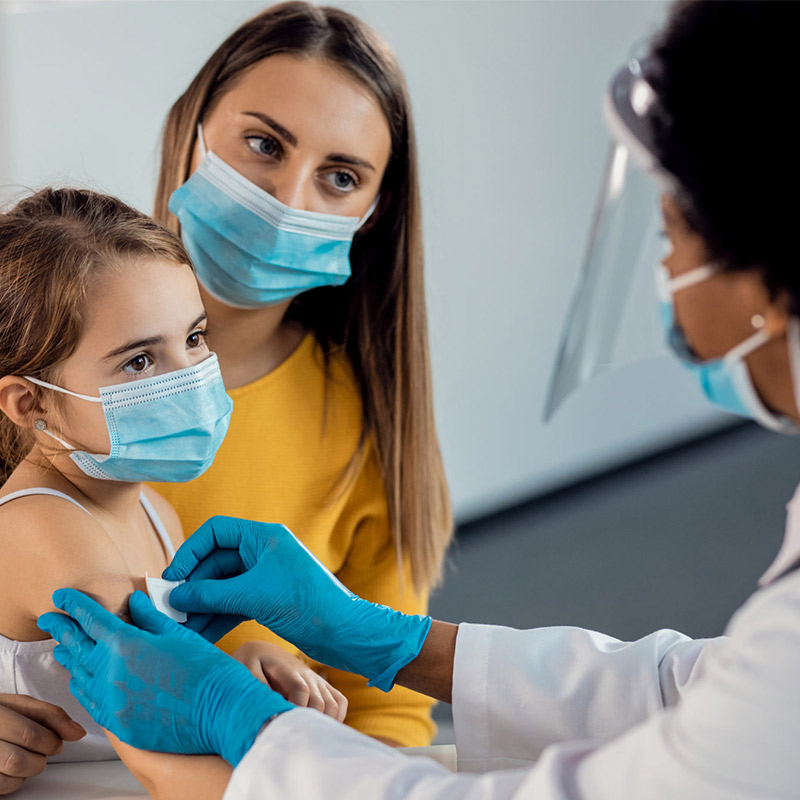A Simple Breakdown of the Ingredients in the COVID Vaccines

January 11, 2021
Four COVID-19 vaccines have been granted Emergency Use Authorization (EUA) from the U.S. Food and Drug Administration (FDA) since mid-December 2020. Prior to authorization by the FDA, these vaccines underwent the same rigorous safety and effectiveness standards as all other vaccines. Quickly, vaccine distribution began, starting with health care professionals on the frontlines of patient care. Once available to the broader public, it became critical that a high percentage of the population received the vaccine in order to achieve herd immunity against COVID-19. Herd immunity occurs when most of a population is immune to an infectious disease (either from previous infection and/or vaccination) and provides indirect protection to those who are not immune to the disease.
There have been many rumors flying around on the internet about what’s in the vaccine. Some rumors even suggested that the vaccines contain gluten, wheat, eggs and even bee venom! All of that is simply untrue.
If you’re among the many wondering “what’s actually in it?” and, “is it safe to receive the injection?”, keep reading.
COVID Vaccine Ingredients
There are two COVID-19 messenger-ribonucleic acid (mRNA) vaccines currently authorized for emergent use in the United States: the Pfizer-BioNTech and the Moderna vaccines. Conventional vaccines rely on weakened and inactivated pathogens or a fragment of the pathogen to trigger an immune response. In contrast, the COVID-19 mRNA vaccines use a new approach by which mRNA is delivered into our cells to provide the genetic instructions for our own cells to “temporarily” make a “specific” viral protein (the coronavirus spike protein) that triggers an immune response.
The Johnson & Johnson (J&J) Janssen COVID-19 vaccine is a type of “replication-incompetent vector vaccine.” This vaccine also contains the genetic instructions to express a stabilized coronavirus spike protein, but instead of mRNA, these instructions are delivered via DNA stored inside a modified vector virus (Adenovirus 26). This adenovirus has been engineered to enter the human cells and deliver the desired genetic information without replicating itself or causing illness. Once inside the cells, the DNA encoding for the coronavirus spike protein can be read by the cell and transcribed into mRNA. At this point, the J&J vaccine acts similarly to the mRNA vaccines.
The Novavax vaccine is a more traditional protein based vaccine, similar to what’s used for the flu shot. Vaccines using protein subunits, like Novavax, have been used for over 30 years in the United States for protection from hepatitis, shingles and other diseases. To make the Novavax vaccine, the genes required to produce the COVID-19 spike protein are put into an insect virus, which is then used to infect moth cells. These cells then produce large amounts of spike proteins that are isolated and mixed with an adjuvant or immune-boosting ingredient.
Thus, Novavax is a protein-based vaccine and does not contain any genetic material. After injecting the vaccine, the body will identify the spike proteins as an intruder and spark an immune response.
The Pfizer-BioNTech COVID-19 vaccine is made of the following ingredients:
- mRNA – Also known as messenger ribonucleic acid, mRNA is the only active ingredient in the vaccine. The mRNA molecules contain the genetic material that provide instructions for our body on how to make a viral protein that triggers an immune response within our bodies. The immune response is what causes our bodies to make the antibodies needed to protect us from getting infected if exposed to the coronavirus.
There are rumors that mRNA vaccines will alter our DNA because the RNA molecule can convert information stored in DNA into proteins. That’s simply, not true. It’s critical to note that the mRNA vaccines never enter the nucleus of the cell, where our DNA is stored. After injection, the mRNA from the vaccine is released into the cytoplasm of the cells. Once the viral protein is made and on the surface of the cell, mRNA is broken down and the body permanently gets rid of it, therefore making it impossible to change our DNA.
- Lipids – The following lipids are in the new COVID vaccine. Their main role is to protect the mRNA and provide somewhat of a “greasy” exterior that helps the mRNA slide inside the cells.
- ((4-hydroxybutyl)azanediyl)bis(hexane-6,1-diyl)bis
- (2-hexyldecanoate), 2 [(polyethylene glycol)-2000]-N,N-ditetradecylacetamide
- 1,2-Distearoyl-snglycero-3- phosphocholine
- cholesterol
- Salts – The following salts are included in the Pfizer vaccine and help balance the acidity in your body.
- potassium chloride
- monobasic potassium phosphate
- sodium chloride
- dibasic sodium phosphate dihydrate
- Sugar – Basic table sugar, also known as sucrose, can also be found in the new COVID vaccine. This ingredient helps the molecules maintain their shape during freezing.
The Moderna COVID-19 vaccine is made of the following ingredients:
- mRNA – Like the Pfizer BioNTech vaccine, Moderna’s also uses mRNA technology to build antibodies against COVID-19.
- Lipids – The Moderna vaccine also requires lipids to help deliver the mRNA to the cells.
- SM-102
- 1,2-dimyristoyl-rac-glycero3-methoxypolyethylene glycol-2000 [PEG2000-DMG]
- cholesterol
- 1,2-distearoyl-snglycero-3-phosphocholine [DSPC]
The remaining ingredients (below), including acids, acid stabilizers, salt and sugar all work together to maintain the stability of the vaccine after it’s produced.
- Acids
- Acetic acid
- Acid Stabilizers
- Tromethamine & Tromethamine hydrochloride
- Salts
- Sodium acetate
- Sugar
- Sucrose
The Johnson & Johnson Janssen COVID-19 vaccine is made of the following ingredients:
- Recombinant, replication-incompetent adenovirus type 26 expressing the SARS-CoV-2 spike protein: a modified and harmless version of a different virus (Adenovirus 26) is used as a “vector” to deliverthe DNA gene sequence to produce the coronavirus spike protein. Once the modified adenovirus vaccine enters into the cells, the body of the virus essentially disintegrates and the DNA material within it travels into the nucleus of the human cell where it is transcribed into mRNA. The coronavirus spike protein is then produced and displayed on the cell’s surface, prompting the immune system to begin producing antibodies and activating T-cells to fight off what it thinks is an infection.
The Adenovirus 26 in the J&J vaccine does not replicate, and like the mRNA vaccines, does not change our genetic code.
- Acids
- citric acid monohydrate
- Salts
- trisodium citrate dihydrate
- Sugars
- 2-hydroxypropyl-?-cyclodextrin (HBCD)
- polysorbate-80, sodium chloride
- Other ingredients
- ethanol
- That's it!
"Overall, the main ingredients in the Pfizer-BioNTech and Moderna vaccines are very similar, and all the currently approved vaccines were found to be safe and efficacious in preventing severe COVID-19 disease in rigorously conducted clinical trials. These COVID-19 vaccines are safe and went through the same rigorous testing process as other vaccines before being approved for emergent use in the United States. Although local and systemic side effects have been reported, as is the case for many other medical interventions, the risk of lacking protection against COVID-19 and developing severe disease far exceeds those posed by the vaccine itself. ” says Juan Ravell, M.D., division chief of allergy and immunology at Hackensack University Medical Center. “These ingredients are safe and the development of these COVID-19 vaccines marks a huge step towards acquiring herd immunity and the end of this pandemic."
The Novavax vaccine is made from the following ingredients:
- SARS-CoV-2 recombinant spike (rS) protein: Moth cells are used to create the spike protein. Genes from the COVID-19 virus are selected to create the spike protein, and then using an insect virus, baculovirus, the moth cells are infected with the baculovirus. The moth cells then replicate, creating lots of spike proteins, which are then extracted and purified. (The vaccine may contain small amounts of baculovirus and insect cell proteins and DNA.)
- Matrix-M (the adjuvant): This contains saponins, a soap like substance, derived from the soapbark tree. Saponins are found in plants like beans and peas. This ingredient helps stimulate the body’s immune response.
- Salts: potassium dihydrogen phosphate, potassium chloride, and sodium chloride.
- Food additives: disodium hydrogen phosphate dihydrate, and sodium dihydrogen phosphate monohydrate.
- Other ingredients include cholesterol and phosphatidylcholine (a chemical found in many foods like eggs and soybeans).
- Water for injection.
“The Novavax vaccine does not contain the live COVID-19 virus, it will not give you COVID, and it’s created using a similar process to how the flu vaccine is developed,” adds Dr. Ravell. “Some people may feel a sense of comfort, knowing the vaccine is made similarly to previous vaccines, but either way, the mRNA vaccines and this protein based vaccine are both effective.”
It is recommended that you receive any of the COVID vaccines available, as they all prevent severe illness and death.
Next Steps & Resources:
- Meet our clinical contributor: Juan Ravell, M.D., division chief of allergy and immunology at Hackensack University Medical Center
- Make an appointment online with Dr. Ravell or a doctor near you, or call 800-822-8905.
Sources:
The material provided through Healthier You is intended to be used as general information only and should not replace the advice of your physician. Always consult your physician for individual care.
- Acids
Find a doctor near me
Clinical Contributors
Exposed to COVID? Here’s When to Get Tested

COVID-19 exposure? Learn when to get tested. Doctors Fleischman and Cicogna offer guidance and next steps. Call 800-822-8905.
Top 6 Questions About COVID-19 Vaccines

COVID-19 Vaccine Questions Answered. Doctors Kountz and Sawczuk provide expert information on safety, availability, and more. Learn more & schedule an appointment.
Find a doctor near me

COVID Vaccine and Children: What to Know
Here's everything parents need to know about the COVID vaccine.

How to Prepare for Your COVID-19 Vaccine
Prepare for your COVID-19 vaccine. Learn how to schedule your appointment, what to wear, and what to bring. Get vaccinated today.

What Are COVID-19 Vaccine Side Effects, and How Long Do They Last?
Here are answers to questions that you may have about COVID-19 vaccine side effects.

How to Make Your Vaccine Visit as Smooth as Possible
Knowing a few things beforehand should make your appointment run more smoothly.

